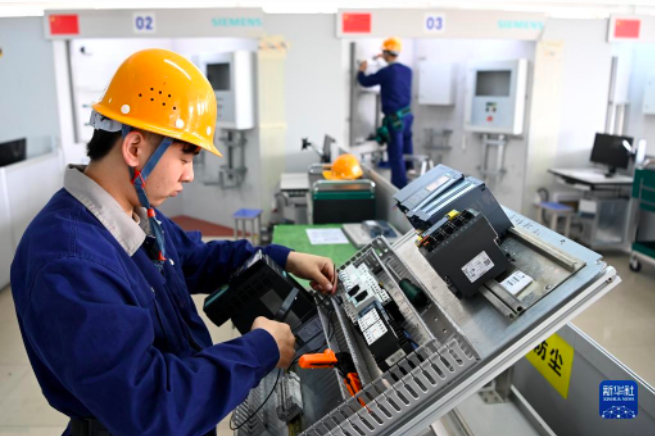China news 9th May 2022
How difficult is it for young Chinese people?
According to the Ministry of Education of China, the number of college graduates in China will reach 10.76 million this year, for the first time. These students have become some of the ‘most graduates in history’ as soon as they leave the school. What awaits them is cruel employment pressure, and thus the most difficult graduation season for fresh graduates.
While supply has increased significantly, traditional recruitment opportunities such as real estate, the Internet and education and training, have been affected by the anti-monopoly laws and COVID and have contracted significantly. Since the beginning of this year, major internet companies, including ByteDance, JD.com and Bilibili, have experienced significant layoffs.

At the same time, the repeated epidemic precautions have also led many enterprises to cut spending. The zero-COVID policy has also caused many markets to shrink significantly.
Chinese officials have warned of this for a long time. Wang Hui, director of the College Student Department of the Ministry of Education, said in January this year:
The main goal of the Ministry of Education is to make every effort to ensure the stability of the employment situation of college graduates in 2022.
However, at the other end of the employment chain is the difficulty companies still have with recruiting people, reflecting the misalignment of young people’s career concepts and the structure of the human capital market.
According to a survey, 83% of Chinese manufacturers said they had a blue-collar labour shortage to varying degrees. 44% of enterprises reported that recruitment difficulties were the biggest problem they faced.

This also shows the changes in young people’s career choices. Young people don’t want jobs that account for more than one-third of their prime time. They do not just want to work mechanically for money. They want to explore the possibilities of broadening themselves through work and realize love at work.
Although this may not meet official goals and social expectations, if it means that they have a deeper spiritual sense and wider thinking, in the long run, it may not be a bad thing.
Source: zaobao.com.
Spending in Generation Z
As a unique and important consumer group, Generation Z has become the next growth engine of domestic consumption in China. It is increasingly important to understand the consumption habits and trends of this young group. Generation Z refers to the population born from 1995 to 2009. Generation Z in China accounts for about one-fifth of China’s total population.
McKinsey’s 2020 China Consumer Survey shows that the new generation in middle low-tier cities has become a new engine of growth. The slowdown in economic growth and rising costs of living have not affected their enthusiasm for purchase, and their contribution to the growth of consumer spending is extraordinary.

Lu Fei, a senior researcher at JD Consumer and Industrial Development Research Institute, told the reporter of China Business Daily:
These young people have a better education and a better income. Although they do their best at work, they also pay attention to improving their quality of life and spiritual enjoyment anytime and anywhere.
In the past, when a promotion came by, I would buy some food, clothing or daily necessities, but now, I have added projectors, game consoles, VR glasses, from home.
Li Wei said. Her consumption is not an exception. According to JD.com, generation Z users accounted for more than 20% of the sales of household appliances in 2021. They prefer to buy audio-visual and audio-visual products, including power amplifiers, home theatres, etc. In the first quarter, the sales volume of micro cameras increased by 57% year-on-year, and VR glasses increased by 55%. Bluetooth headphones increased by 45%.
Generation Z in China is more used to omni-channel shopping. Take clothing as an example, nearly 40% of Chinese Generation Z consumers said they would go to stores to see physical objects and place orders online; only 15% to 30% of Generation Z in other countries will do so. However, less than 20% of China’s Generation Z consumers will browse clothing online and offline at the same time. This shows that online and offline channels play different roles in the omni-channel experience of Generation Z in China.
Higher expenditure on spiritual consumption
In the era of information explosion, watching movies, listening to music, reading/listening to books have become the most important spiritual consumption of contemporary young people.
Compared with the post-70s and earlier generations, Chinese young people nowadays are basically free from needing to buy food and clothing. They are better educated, have a richer spiritual world, and have a stronger pursuit of non-material aspects.
Lu Fei said. Generation Z’s interest in recreation, learning, literature, and art is higher than that of other age groups.
Lu Fei said that their survey found that unlike traditional leisure, young people don’t like inspiration so much, but pay attention to carbon neutrality. According to data from JD Books, compared with the first quarter of 2021, the number of young people buying carbon and related books in the first quarter of 2022 increased 12 times year-on-year. People under the age of 25 and people aged 36 to 45 are the most enthusiastic about buying carbon-neutral literature. According to the McKinsey, Generation Z expressed concern about sustainability throughout the Asia-Pacific region.

Generation Z is the most digitized generation at present. Their consumption also has distinct characteristics. Brands should also accurately grasp the unique characteristics of this consumer group.
McKinsey said.
Source: zaobao.com.
Worked on the article:

Wanlikhang





